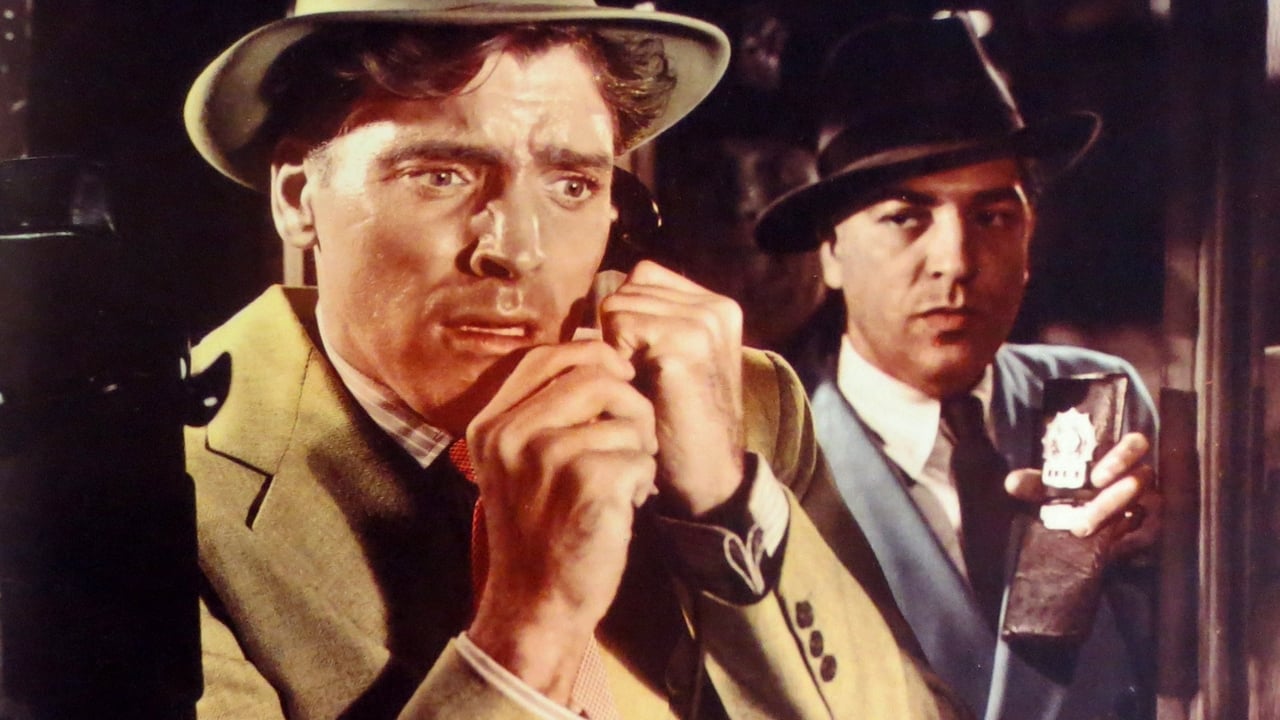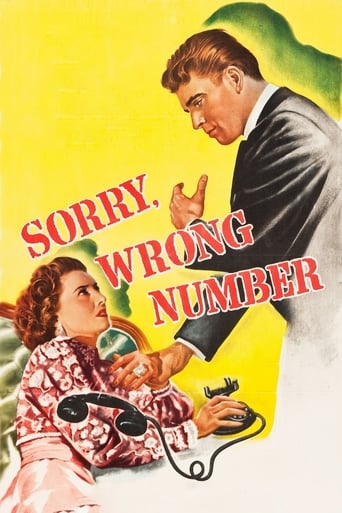

Wonderfully offbeat film!
... View MoreWhat a freaking movie. So many twists and turns. Absolutely intense from start to finish.
... View MoreThe film makes a home in your brain and the only cure is to see it again.
... View MoreA clunky actioner with a handful of cool moments.
... View MoreComplicated (multiple flashbacks within flashbacks) but highly engrossing, Sorry Wrong Number still packs a wallop - even with today's more blasé and less tolerant audiences. Litvak's driving direction with its remarkably mobile camera moodily prowling through appropriately lavish sets and strikingly noirish natural locations, superbly abets Lucille Fletcher's grippingly bizarre screenplay. Litvak isn't afraid to use close-ups either. And his players not only stand up to this relentless probing but offer some of the greatest performances of their lives. Both Stanwyck and Lancaster make formidable principals. Outstanding character study contributors include Shirley Ann Richards, Wendell Corey, Harold Vermilyea and the ever-reliable Ed Begley. Note Joyce Compton as the blonde who briefly interrupts Begley's all-alone-in-the-big-house phone chat; and director Anatole Litvak as a diner in dark glasses - As an inside joke, Lancaster testily turns to waiter Vuolo and pointedly asks: "Who is that man?").
... View MoreA great example of film noir, 'Sorry, Wrong Caller' has a taut script, with a bed-ridden woman getting connected into a phone call between thugs planning a murder that evening, and proceeding to tell her story in flashbacks as the fateful hour looms. Barbara Stanwyck plays her character very well, ranging from dominating rich girl to frightened invalid, and a young Burt Lancaster is her handsome husband who wants to be more than a kept man. Director Anatole Litvak includes some nice shots, including a creepy pan back from Stanwyck's bedroom, out her window, and down to the shadow of an approaching man, and he's also faithful to the original radio play, which I first read in McSweeney's 'Hitchcock and Bradbury Fistfight in Heaven'. Definitely worth checking out.
... View MoreThis is a brief review of "Decision Before Dawn", "Sorry, Wrong Number" and "The Long Night", three films by director Anatole Litvak.Born in the Ukraine, Litvak's career as a film-maker took him from Russia to Germany to France and eventually to Hollywood, where he became a contract director for Warner Bros. He directed "Decision Before Dawn, regarded as one of his finest pictures, in 1951. It tells the tale of Happy (Oskar Werner), a German soldier who, in 1944, defects and becomes an Ally double agent. At the command of American Colonel Devlin (Gary Merrill), Happy embarks on a mission deep behind German lines."Decision Before Dawn" was one of many Hollywood films released in the 1950s which attempted to rehabilitate Germans as "now our allies". Like the similarly themed "The Big Lift" (1950), it boasts superb location photography, Litvak filming in actual cities still scarred by war and still littered will real WW2 machinery. Whilst the film's promises of complexity are eventually betrayed, Litvak's establishing shots, handling of spaces and architecture, his grand outdoor vistas and a beautifully dour performance by Oskar Werner, elevate things tremendously. Werner would milk similar material in Martin Ritt's 1963 masterpiece, "The Spy Who Came in From the Cold". Today, "Decision Before Dawn" plays like a rebuke to Litvak's own "Confessions of a Nazi Spy" (1939), one of the first blatantly anti-Nazi films.Released in 1947, and a remake of Marcel Carne's superior "Le Jour Se Leve", Litvak's "The Long Night" stars Henry Fonda as Joe Adams, a man who blockades himself in an apartment following the murder of Maximillian the Great (Vincent Price), a nightclub magician. Via flashbacks we delve into the circumstances which led to this crime.Typical of Litvak, "The Long Night" boasts audacious camera work. Litvak's whip-pans, cranes, clever forced perspectives and snaking cameras were novel for the era, and his locations drip with atmosphere. While beautiful in a clinical way, Litvak's visuals still can't match Carne's poetic realism and the gauzy romantic humanism which made "Le Jour Se Leve" so famous. Litvak's film – noirish and brooding – also ends on a note of optimism, a reversal of the Carne's more downbeat ending. The film was a financial flop.Litvak released "Sorry, Wrong Number" (1948) a year later. A precursor to high-concept, modern thrillers, "Number" stars Barbara Stanwyck as Leona, a crippled woman who overhears a murder plot on her telephone. From her bedroom – the film's base of operations – Litvak's camera embarks on a dizzying quest to avert the crime, dipping into the past, different locations, through telephone lines and back out again."Sorry, Wrong Number" was based on a Lucille Fletcher radio play, which Litvak's aesthetic attempts to break free from. He glides from New York suites to State Island beaches to Manhattan skylines, but the film's print-oriented origins are hard to escape. Interestingly, Stanwyck's character is revealed to suffer from psychosomatic issues, and it is her very own flights-of-fancy, her constricting nature (epitomised by her crippled legs) which results in the film's central crime. Leona smothers her lover (Burt Lancaster), wants to make him as immobile as she is, a fact which pushes him into criminality. Throughout the film, Leona's stationariness is thus contrasted with the film's countless telephones and telephone wires, devices which seem to enable and amplify Leona's neuroses. Rather than connecting her to the outside world, these wires alienate Leona further, wrapping her up in paranoia and further illusions of control. Litvak followed "Number" up with "The Snake Pit", "Wrong Number's" thematic mirror image.7.5/10 – Worth one viewing. See "Young Man With a Horn" (1950).
... View MoreAnatole Litvak directed this suspenseful tale that stars Barbara Stanwyck as Leona Stevenson, a rich but neurotic heiress who is now bedridden, and married to Henry(played by Burt Lancaster) who loves her but resents having his ambitions stifled by her father, and is getting tired of her hypochondria. One night, Leona picks up the phone and is horrified to overhear a sinister, cross-wired conversation involving two men discussing the imminent murder of a woman. Leona frantically tries to convince both Henry and the Police of this, but is unable to, and will come to learn that the murdered woman is to be her... Based on a successful radio play, film is quite interesting, as its plot unfolds via flashback, with mounting tension leading to a truly chilling end...
... View More